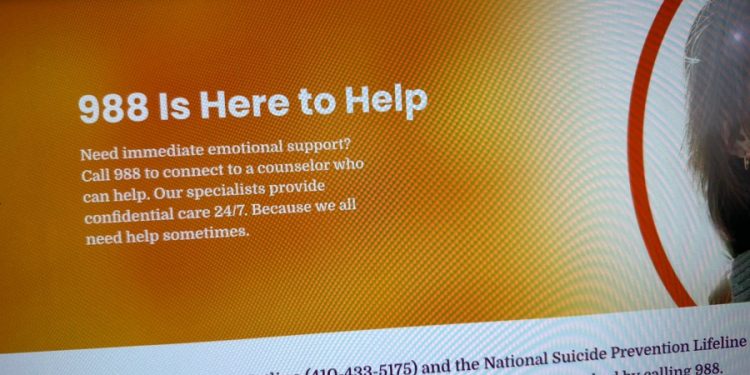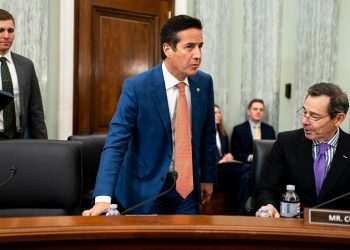States and mental health organizations are bracing for the closure of a specialized service within 988, the National Suicide and Crisis Lifeline, for LGBTQ youth on Thursday under orders from the Trump administration amid its broader spending cuts and the dismantling of programs dedicated to diversity and inclusion.
“When the line goes silent, there are a lot of open questions that we’re trying to prepare for,” said Mark Henson, vice president of government affairs at the Trevor Project, an LGBTQ youth suicide prevention organization that responds to roughly half of 988’s calls and text messages from LGBTQ young people.
The group, which has worked to improve youth mental health outcomes since 1998, launched an “emergency lifeline campaign” following the announcement from the Substance Abuse and Mental Health Services Administration (SAMHSA) last month that 988 would “no longer silo” LGBTQ youth services beginning July 17.
Funds raised through the campaign will help the Trevor Project continue “to protect and support LGBTQ+ young people in the face of significant funding losses,” according to the group’s website, including by hiring new crisis counselors in anticipation of surges in demand, as well as maintaining existing staffing.
Federal funding has allowed the Trevor Project to double its capacity in the three years since the 988 Suicide and Crisis Lifeline formally launched in 2022, said Henson.
President Trump signed the bipartisan National Suicide Hotline Designation Act, which established 988 as the universal phone number for mental health emergencies, in 2020, shortly before leaving office.
The bill that Trump signed acknowledged disproportionately high suicide rates among young LGBTQ Americans. It tasked SAMHSA with recommending how to best help “callers who are LGBTQ youth, minorities, rural individuals, or members of other high-risk populations” access competent, specialized services.
In a 2024 Trevor Project report, 39 percent of LGBTQ 13- to 24-year-olds in the U.S. said they had seriously considered suicide over the past year, including 46 percent of transgender and nonbinary youth. Half of LGBTQ young people who wanted mental health care said they were unable to access it.
Since its 2022 launch, 988’s specialized service for LGBTQ youth has received nearly 1.5 million calls, texts and online chat messages. Counselors fielded roughly 70,000 crisis contacts in April, the latest month for which such data is available, marking an all-time high.
“The specialized service has been incredibly successful,” said Adrian Shanker, a senior adviser on LGBTQ health equity for the Department of Health and Human Services (HHS) under former President Biden. “There’s also been societal factors that have increased the need for the service, and it’s an insult upon injury that the specialized service would be removed at this point in time.”
A flurry of executive orders and policies enacted since Trump’s return to office in January directly target LGBTQ Americans, particularly those who are transgender. An order Trump signed on Jan. 20, his first day back, proclaims that the U.S. recognizes only two unchangeable sexes, male and female.
SAMHSA’s announcement last month that it would shut down the LGBTQ youth suicide hotline within 30 days said the program had previously served “LGB+ youth,” removing “transgender” from the acronym.
In a Jan. 27 order titled “Prioritizing Military Excellence and Readiness,” Trump said a person’s belief that they are transgender is a “falsehood” inconsistent with the “humility and selflessness required of a service member.”
Calls to the Trevor Project, which also operates separately from 988, jumped 33 percent on Trump’s Inauguration Day, according to the group, following a larger surge on Election Day.
Henson, the Trevor Project’s vice president of government affairs, said the organization expects to see continued spikes in demand as the federal government goes after transgender rights and diversity and inclusion initiatives. But operating on a reduced staff will likely increase wait times, he said, “and every minute counts when you’re in a crisis.”
Trump administration officials have insisted that, despite the end of 988’s LGBTQ specialized service line, funding for the lifeline and its overall functionality will remain the same.
“The President’s Budget funds the 988 at $520 million — the same number as under Biden,” Rachel Cauley, the White House Office of Management and Budget’s communications director, told The Hill following last month’s SAMHSA announcement. “It does not, however, grant taxpayer money to a chat service where children are encouraged to embrace radical gender ideology by ‘counselors’ without consent or knowledge of their parents.”
Shanker, now an LGBTQ health policy consultant in Washington, said he worries the administration’s actions may dissuade LGBTQ young people in crisis from contacting 988.
“The Trump administration has absolutely eroded trust in their own public health interventions, including in 988,” he said. “We don’t know how harmful that that lack of trust will be in terms of people’s willingness to continue to call 988; I certainly hope that that LGBTQ youth in crisis will still continue to call and seek out the support that they need.”
“I wouldn’t discourage them from calling — in fact, I hope they will call,” Shanker added. “But it’s a big question. It’s very hard to repair trust in government services, and the damage that has been done by [Health Secretary Robert F. Kennedy Jr.] and his team is pretty severe.”
In May, more than 100 House Democrats — and senators, in a separate letter — said following through on the administration’s plan to close the specialized service for LGBTQ youth would have “lethal consequences.” Republican Reps. Mike Lawler (N.Y.) and Young Kim (Calif.) also protested the hotline’s closure, as did more than 100 celebrities across the entertainment industry in a letter organized by the Trevor Project.
Henson said the organization is still holding out hope that Congress will act to save 988’s specialized LGBTQ services, even if it means waiting until the next fiscal year.
“We are working with Congress to both push back against the administration on this,” he said, “but then try for the next fiscal year, for October 1, to have Congress assert its authority to say, ‘Hey, no, no, this is vital. This is what this money needs to be spent on.’”
SAMHSA’s announcement last month also prompted some state and local governments to take action.
A motion put before the Los Angeles County Board of Supervisors on Tuesday would direct the city’s mental health department to collaborate with the Trevor Project and local 988 call centers to “explore options” to keep the helpline’s LGBTQ crisis service active in the region. Legislation introduced in February, before a leaked budget document revealed the Trump administration planned to eliminate 988’s specialized services for LGBTQ youth, would require IDs issued to public middle-school students in California to include the number for the Trevor Project’s suicide hotline.
On Saturday, demonstrators and elected officials in New York City gathered outside Trump Tower in Manhattan to protest the administration’s decision to close the hotline. The Communications Workers of America District 1, which co-organized Saturday’s rally with local labor and nonprofit groups, said cuts to the hotline would cost more than 200 jobs.
Roughly a dozen crisis workers in New York and New Jersey are expected to lose their jobs, Gothamist reported this month. CommUnity Crisis Services, a service line operator in Iowa City, Iowa, said earlier this month that it plans to lay off 49 workers, citing a stop-work order from the Trump administration, the Iowa City Press-Citizen first reported.
“We’re letting go of really experienced, really passionate people, and it’s really just heartbreaking,” said Henson. “Talking to these folks, they’re overwhelmed with emotion, but they’re not overwhelmed that they’re losing their job — they’re overwhelmed that they will no longer have the chance to serve and support people whose shoes they were in 5, 10, 15 years ago.”















